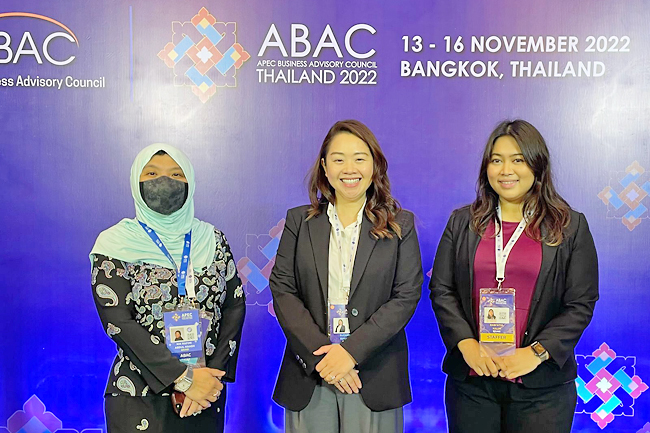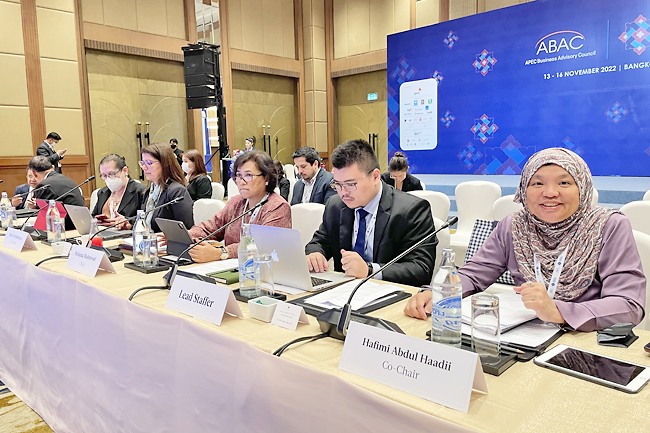Danial Norjidi
Following their recent fourth meeting of the year, the Asia-Pacific Economic Cooperation (APEC) Business Advisory Council (ABAC) relayed to APEC leaders a message emphasising the imperative for collective leadership and decisive action to accelerate economic recovery and secure long-term prospects for growth.
According to the ABAC, this comes as the world continues to grapple with urgent and interrelated challenges including the continuing pandemic, geopolitical conflict, rising inflation, food and energy insecurity, the existential threat of climate change and ongoing supply chain disruptions.
ABAC members met in Bangkok from November 13 to 16 to conclude a comprehensive year-long work programme that drew inputs from business and academia from across APEC. They relayed the resulting report and recommendations in addition to their urgent call for cooperation to leaders at a dialogue on November 18.
The ABAC Dialogue with Leaders was held after the APEC CEO Summit and built on engagement during the year between ABAC and APEC Ministers of Trade and of Finance, and participation in high level meetings and sectoral ministerial meetings including on food security, women and the economy, small and medium enterprises (SMEs) and tourism.
ABAC also approved its work programme for 2023 around the theme of ‘Equity.
Sustainability. Opportunity’. Incoming ABAC Chair for 2023 Dominic Ng of ABAC USA noted, “In formulating our work programme, we were guided by three principles.


“First, we need to ensure that ABAC’s work considers the circumstances of people in our region. They should have a stake in – and benefit from – the work of APEC. Second, ABAC should focus on policies that advance economic growth in balance with the environment and maximise the private sector’s potential to address climate change. Finally, we should promote policies that expand economic opportunity by increasing access to training, technology, capital, and other tools that enable people to contribute to the growth of our region.”
At the meeting, it was also announced that ABAC Brunei member and LVK Group of Companies Executive Director Nik Hafimi binti Abdul Haadii will be Chair for Inclusion Task Force in 2023, with initial areas of focus on women’s economic empowerment, engaging indigenous people in the economy, formalising the informal economy and bridging generations through economic engagement.
Nik Hafimi said, “ABAC’s recommendations to APEC leaders and the dialogue during the APEC Economic Leaders’ Meeting (AELM) can act as pivotal turn-points post pandemic but as business leaders we believe in enabling impact.
“We look forward to also welcoming ABAC members to Brunei Darussalam for the 2023 – ABAC II meeting Insya Allah and that we will convey to our ABAC and APEC counterparts that Brunei Darussalam is open and serious on creating and increasing economic diversification and sustainable recovery,” she added.
ABAC Brunei member and imagine Sdn Bhd Chief Executive Officer Suzannawati binti Haji Suharju also commented, saying, “After year-long comprehensive work, ABAC members had the opportunity to present to APEC leaders, ABAC’s practical recommendations in support of economic recovery and to secure long term future growth.
“Underlying in the recommendations made is the need for economies to collaborate and contribute and for leaders to take on decisive actions together,” she added. “I would also like to extend our sincere appreciation to ABAC Thailand including ABAC Chair 2022 Kriengkrai Thiennukul for his leadership during the year and look forward to the leadership of the incoming Chair for 2023, Dominic Ng of ABAC USA.
“ABAC Brunei is excited to announce we will be hosting ABAC II 2023 meeting in Brunei and to welcome our ABAC colleagues and to showcase what our nation has to offer,” she said.
A statement from ABAC noted that Deputy Prime Minister and Minister of Energy of Thailand Supattanapong Punmeechaow delivered the keynote address to open the ABAC IV meeting, stressing the uncertain and gloomy outlook for the global economy.
Chairman of the Federation of Thai Industries Kriengkrai Thiennukul said that the current context means that the dialogue – the first in-person dialogue to take place since 2018 – came at a critical time. The chair also said that ABAC would impress on leaders that challenges demand both leadership and decisive action from APEC economies.
“We, in the business community, are eager to contribute, collaborate and advance recovery to secure future growth,” the Chair said.
“ABAC has proposed a range of actions to deepen economic integration, including supporting a stronger and more relevant World Trade Organization (WTO) and accelerating the journey towards the Free Trade Area of the Asia-Pacific through a structured work programme that would deliver tangible benefits for businesses in the short to medium term.
“We are also seeking to integrate sustainability including the climate response across APEC’s growth agenda, including through practical actions such as enabling trade in environmental goods and services, and a new framework for trade and investment in renewable energy.
“It is also critical that we enable the digital economy and promote digital transformation for resilience and growth, especially for micro, small and medium enterprises (MSMEs).
“This year, ABAC delivered on cybersecurity, digital identities, data sharing, digital trade facilitation, health-tech and infrastructure with immediately actionable recommendations.
“We also commissioned an important report from the USC Marshall School of Business on ‘The New MSME Economy: Post-Pandemic Drivers for Growth’, which similarly highlights the importance of digital capability.”
“The actions are fundamental to enabling a seamless, dynamic, resilient, and sustainable region – and a place where everyone including disadvantaged and under-served groups can enjoy the benefits and opportunities offered by deeper regional economic integration”, he added.






